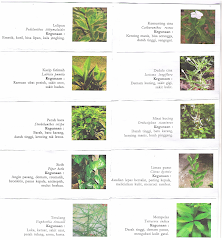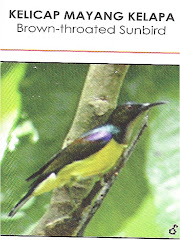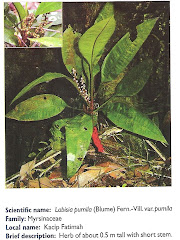ECOTOURISM
Ecotourism is rapidly becoming a leading way for developing countries to bring in foreign revenue by preserving their rainforests. Eco-tourists pay to see a country's natural beauty, not the destruction caused by short-run exploitation. Money spent directly in the local economy helps give economic value to forest preservation. The locals, along with the government, can see the importance of keeping the forest intact. Most tourists are willing to pay directly for preservation in the forms of park entrance fees and donations.
Ecotourism can provide local people with economic assistance by offering them employment opportunities as wildlife guides and rangers for parks, and as workers in the service force of hotels and lodges. This employment provides a relatively even flow of income often higher than they would receive from selling their marginal, small-scale agricultural crops at market. With eco-tourism, income is earned from preserving the ecosystem, and forest clearing is discouraged because it is detrimental to income. Similarly, ecotourism can reduce the need for poaching and hunting of forest animals for income. For example, in West Africa, former poachers are hired as park rangers since they have intimate knowledge of local animal wildlife. Ecotourism also provides the opportunity for intellectual advancement for locals educated as wildlife guides. With an education, their children will have a better chance of breaking out of their subsistence lifestyle and improving their livelihood. Finally, local communities can earn supplementary income from the fabrication of handicrafts.
Some hints for successful ecotourism in Madagascar
How to travel ethically
How to be an ethical traveler
Visiting the rainforest - a practical guide
Eco vacationers engage in cutting-edge environmental research
While ecotourism is promising, it must be carefully developed and well planned, because short-term development can doom rainforests just as logging has, with extensive damage to the environment. Several countries, including Costa Rica and Malaysia, are facing adverse effects from tourism (it can no longer be considered "eco"-tourism). Costa Rica is one of the best examples of a tropical country developing its ecotourism potential to its fullest. Every year, hundreds of thousands of foreigners visit Costa Rica's many national parks, making tourism the country's third largest industry behind coffee and bananas. However, some of the parks are being overwhelmed by the mass numbers of tourists and are consequently losing species which seek out areas away from noisy, intrusive humans. Meanwhile, in the Bornean parts of Malaysia, Sabah, and Sarawak, environmentalists are concerned over extensive new development for tourism. Construction requires locally cut wood, resulting in deforestation, while pollution and sewage are a problem in otherwise pristine environments. A mass inflow of tourists can also be damaging to forest trails and frightening to wildlife.
To be sustainable, ecotourism requires careful planning and strict guidelines; short-term development can doom forests as easily as unsustainable logging. Too many people, inadequate facilities, and poor park management can spell the end for the "eco" in ecotourism. Eco-tourism, when carried out in a sustainable fashion, can be very beneficial to local people, the economy, and the environment. It should not be restricted to legally protected areas, but should also be promoted in natural areas that lack protection. The presence of tourists, when properly managed, protects the area from over-exploitive activities.
أَلَمْ تَرَ أَنَّ اللَّهَ يُسَبِّحُ لَهُ مَنْ فِي السَّمَاوَاتِ وَالأرْضِ وَالطَّيْرُ صَافَّاتٍ كُلٌّ قَدْ عَلِمَ صَلاتَهُ وَتَسْبِيحَهُ وَاللَّهُ عَلِيمٌ بِمَا يَفْعَلُونَ Tidakkah kamu tahu bahwasanya Allah: kepada-Nya bertasbih apa yang di langit dan di bumi dan (juga) burung dengan mengembangkan sayapnya. Masing-masing telah mengetahui (cara) solat dan tasbihnya, dan Allah Amat Mengetahui apa yang mereka kerjakan. an-Nur:41
Tazkirah
Sami Yusuf_try not to cry
mu'allim Muhammad Rasulullah Sallallahu alaihi waSalam
ummi_mak_mother_ibu_Sami Yusuf
zikir Tok Guru Nik Abdul Aziz Nik Mat Mu'allimul Mursyidi
syeikh masyari afasi
ruang rindu
song
Arisu Rozah
Usia 40

Mudah mudahan diluaskan rezeki anugerah Allah
usia 40 tahun

UPM

Kuatan Pahe Darul Makmur
pemakaian serban semsa menunaikan solat_InsyaAllah ada sawaaban anugerah Allah
Rempuh halangan

Abah_menyokong kuat oengajian Ijazah UPM

usia 39 tahun

usia 23 tahun_UPM
An_Namiru

Ijazah Pengurusan Hutan UPM

General Lumber_Nik Mahmud Nik Hasan

Chengal

Tauliah

Semasa tugas dgn general lumber

PALAPES UPM

UPM

Rumah yang lawa

Muhammad_Abdullah CD
semasa bermukim di Kuatan Pahe Darul Makmur
Ijazah

air terjun

Borneo land

GREEN PEACE
GREEN PEACE
Kelang

Ahlul Bayti_ Sayid Alawi Al Maliki

Asadu_ Tenang serta Berani

atTiflatul Falasthiniin

Sayid Muhammad Ahlul Bayt keturunan Rasulullah

AnNamiru_SAFARI_Kembara

AnNamiru_resting

Hamas

sabaha anNamiru fil nahri

Namir sedang membersih

Tok Guru Mualimul_Mursyid

An_Namiru
.jpg)
Namir_istirehat
.jpg)
SaaRa AnNamiru fil_Midan
.jpg)
Renungan Sang Harimau_Sabaha AnNamiru
.jpg)
Syaraba AnNamiru Ma_A
.jpg)
AnNamiru_Riadhah
.jpg)
AnNamiru_Riadhah
.jpg)
AnNimru ma_A waladuha
Namir fil_Ghabi (sebut Robi...
Namir

AdDubbu_Beruang di hutan

Amu Syahidan Wa La Tuba lil_A'duwwi

AsSyahid

Namir

Tangkas
najwa dan irah

sungai

najwa

najwa

Kaabatul musyarrafah

unta

Jabal Rahmah

masjid nabawi

masjid quba

dr.eg

najwa dan hadhirah

along[macho]
![along[macho]](https://blogger.googleusercontent.com/img/b/R29vZ2xl/AVvXsEjuMi7D33CmR0_KXrCW2XigfLcUuQurcvtqOS139ncCwEzCyB-jUopk7QK7anADIenJEm2S0N6gAY1ubnACYXewgiAsI3rBjnLTawM39alLL-rEopOoVqn0w5WpLhPJH3hrXNtchEhgtyaI/s240/P7150023.JPG)
harissa dan hadhirah

adik beradik
Tongkat Ali

Tongkat Ali
herba kacip Fatimah

herba Kacip Fatimah
hempedu beruang

hempedu beruang
hempedu bumi

hempedu bumi
herba misai kucing

herba misai kucing
herba tongkat Ali
.png)
Tongkat Ali
Ulama'

Ulama'
kapal terbang milik kerajaan negara ini yang dipakai pemimpin negara

kapal terbang
Adakah Insan ini Syahid

Syahid
Tok Ayah Haji Ismail

Saifuddin bersama Zakaria

Dinner....
Sukacita Kedatangan Tetamu
Pengikut
Kalimah Yang Baik

Ubi Jaga

Ubi Jaga
Arkib Blog
Burung Lang Rajawali

Chinese Sparrowhawk
Kelicap Mayang Kelapa

Brown-Throated Sunbird
Kopiah

Pokok Damar Minyak

Kacip Fatimah

Mengkudu Akar



